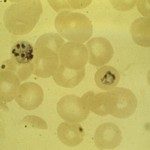Lien vers Pubmed [PMID] – 28507195
Lien DOI – a02681510.1101/cshperspect.a026815
2017 Oct; 7(10):
During the blood stage, Plasmodium spp. merozoites invade host red blood cells (RBCs), multiply, exit, and reinvade uninfected RBCs in a continuing cycle that is responsible for all the clinical symptoms associated with malaria. Entry into (invasion) and exit from (egress) RBCs are highly regulated processes that are mediated by an array of parasite proteins with specific functional roles. Many of these parasite proteins are stored in specialized apical secretory vesicles, and their timely release is critical for successful invasion and egress. For example, the discharge of parasite protein ligands to the apical surface of merozoites is required for interaction with host receptors to mediate invasion, and the timely discharge of proteases and pore-forming proteins helps in permeabilization and dismantling of limiting membranes during egress. This review focuses on our understanding of the signaling mechanisms that regulate apical organelle secretion during host cell invasion and egress by malaria parasites. The review also explores how understanding key signaling mechanisms in the parasite can open opportunities to develop novel strategies to target Plasmodium parasites and eliminate malaria.
